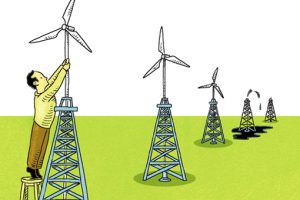
Robots in Your Future
By 2025, a driverless vehicle will navigate rush-hour traffic in Mexico City or São Paulo. A criminal group will use a drone to attack security forces or critical infrastructure somewhere in Latin America. And at least one government in the region will face a major crisis due to job losses caused by robotics and computerization. … Read more

Harsher Prison Sentences Don’t Curb Crime
By most statistical measures, Latin America’s mano dura (iron fist) approach to crime has failed. The tough sentencing policies and draconian prison regimes adopted by most countries in recent decades have had almost no evident impact on crime rates. Even as prison populations in the region have skyrocketed, soaring homicide rates have made Latin America … Read more

The Academic-Policy Divide
As senior officials in President Barack Obama’s administration deliberated during the summer of 2009 over how to respond to the ouster of leftist Honduran President Manuel (Mel) Zelaya, one American political scientist suggested at a State Department-sponsored forum that the administration “should just bring him back.” At the time, I was an Obama appointee at … Read more

What’s Putin’s Game in the Western Hemisphere?
Click here to read a sidebar on Russian arms sales to Latin America. Haz click aquí para leer una versión de este artículo en español. When President Vladimir Putin announced plans to visit Latin America, most observers would have been right to conclude that it reflected Russia’s renewed interest in building ties with a region … Read more
Re-Thinking the OAS: A Forum
Growing regional divisions between—but not limited to—the north and the rest of the hemisphere and the emergence of new regional organizations have focused attention on the role and purpose of the 66-year-old Organization of American States (OAS). This discussion comes as the 10-year term of the much-criticized Secretary General José Miguel Insulza draws to an … Read more

Brazil’s Global Ambitions
When President Dilma Rousseff first took office in 2010, Brazil’s future looked exceptionally bright. For nearly a decade, the country had benefited from Asia’s enormous appetite for its commodities. This allowed Brazil to reduce poverty and expand the middle class while at the same time sustaining a remarkable growth rate, becoming the seventh largest economy … Read more

Resource Extraction and Protest in Peru
Resource extraction—and especially mining—has powered Peru’s economic growth and driven the country’s social investment policies since the 1990s. Since its transition to democracy in 2001, Peru has seen its gdp more than double. However, the benefits of this growth haven’t been distributed equally, and increasing reliance on the extractive industry has brought rising levels of … Read more

Latin America’s New Era of Regionalism
The twenty-first century has witnessed a change of era in Latin American regional governance projects. Those projects seek—explicitly or implicitly—to reduce the influence of countries north of the Rio Grande in political, economic and social processes and outcomes in the region. With these regional policy initiatives has come a new academic focus on diplomacy and … Read more
Family Farming: Accomplishments and Next Steps
In the past 20 years, Latin America and the Caribbean have seen the most dramatic decline in malnutrition of any developing region. The percentage of undernourished people in the region has fallen by almost two-thirds since the early 1990s, and currently stands at 6.1 percent. The region has not only met the UN Millenium Development … Read more

Fighting Corruption: Easy to Promise, Hard to Achieve
The disappearance and apparent murder of 43 students in Iguala, Mexico, last September is a stark reminder of how organized crime and corruption are intertwined. The students were arrested by police officers allegedly sent by the mayor of Iguala, José Luis Abarca, to intercept their buses on their way to a demonstration. Reportedly, the students … Read more

Dispatches: Amazonas, Brazil
A lot of people would like to know how Ivan Tenharim died. On the afternoon of December 2, 2013, a relative found the chief of the Tenharim people in Brazil’s Amazonas state lying unconscious near his undamaged motorcycle on a long, uninhabited stretch of the Trans-Amazonian Highway. His neck was broken, and blood was trickling … Read more

No: The Constraints to Developing Renewables are Too High
While many have suggested that renewable energy can be a viable alternative for countries dependent on Venezuela’s PetroCaribe, it cannot address the region’s short-term energy needs. While there could be potential long-term savings, the short-term costs of investing in renewables, the declining cost of non-renewables, and the need to overhaul existing energy infrastructure are formidable … Read more

Yes: Renewables Are a Start—But NAFTA Has to Help.
The current situation cannot continue. The news of oil sinking to around $60 dollars per barrel, combined with Venezuela’s large fiscal deficit and deteriorating economy, makes the country’s annual $8 billion oil subsidy to PetroCaribe nations increasingly unsustainable. The question is, what will replace it. Fortunately, the 17 member countries of PetroCaribe don’t have to … Read more

Politics Innovator: Intercultural Commission of Mejoremos Guate
Conflicts between Guatemalan Indigenous communities and corporations have raged for decades. One tragic example: in the early 1980s, at least 444 members of Maya-Achi communities protesting construction of the Chixoy Dam on the Rio Negro were killed by government troops (a reparations plan was announced in 2014). Yet since 2013, a group of businesspeople and … Read more

Business Innovator: Amazon Beer Cervejaria
The high wall that separates Amazon Beer’s brewery and bottling plant from the teeming jungle hardly holds back the snakes, monkeys and giant hairy spiders. But invasive animals are only one of the challenges faced by Arlindo Guimarães and his son Caio in developing the only craft brewery in the Amazon. “A lot of people … Read more


